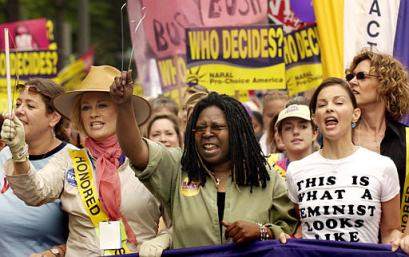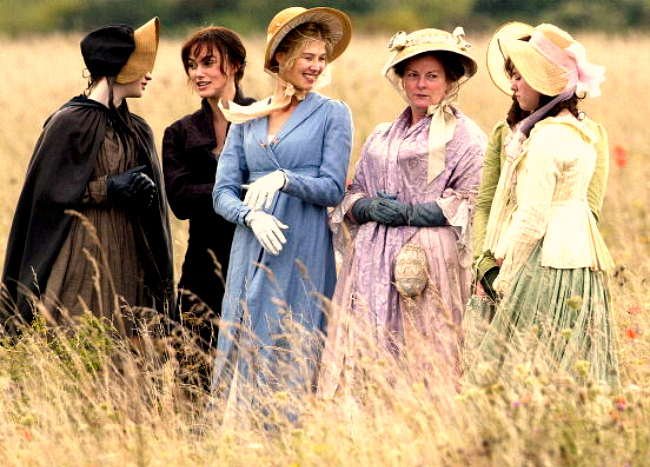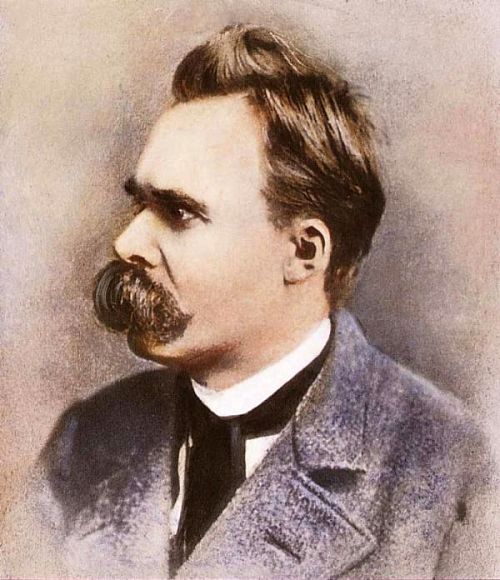Yesterday I read the most insightful essay I have ever read about feminism, Roger Devlin’s “Home Economics” published in five parts at Counter-Currents. Since the original essay, “Home Economics” is 14,000 words I cut it by half (very few ellipsis added between unquoted paragraphs):

1. Two conflicting conceptions of feminine dignity
One of the hallmarks of Western civilization is the unusually high status it has accorded women. That has often been attributed to the influence of Christianity, which prizes certain typically feminine virtues (mercy, humility) more than pagan society had.
Feminists, as we all know, assert that women are rightfully the “equals” of men and deserve a “level playing field” on which to compete with them. In our time, it is a rare person whose notions about women’s claims remain wholly uninfluenced by these slogans; that is true even of many who think of themselves as opponents of feminism.
For example, certain would-be defenders of Western civilization believe Islam presents a danger to us principally because it does not accept “equality of the sexes.” Indeed, they sometimes make it sound as though they would have no objection to Islam if only Muslim girls were free to wear miniskirts, join the Army, and divorce their husbands. Or again, many in the growing father’s movement describe their goal as implementing “true” equality rather than recovering their traditional role as family heads. I have even known conservatives to earnestly assure young audiences that the idea of sexual equality comes to us from Christianity—a crueler slander upon the Faith than Voltaire or Nietzsche ever imagined. The extreme case of such confusion can be found in “mainstream” conservatives such as William Kristol, who claims to oppose feminism on the grounds that its more exotic manifestations “threaten women’s recent gains”: in other words, the problem with feminism is that it endangers feminism.
It is difficult to combat a movement whose fundamental premises one accepts. In fact, the high standing of women in our civilization not only long predates feminist ideology but is logically incompatible with it.
To understand why, one needs to keep two points in mind: 1) women’s traditional status was linked to behavioral expectations—fulfilling the duties of their station; and 2) it assumed qualitative differences and complementarity (rather than “fair” competition) between the sexes.
As to the first point: strictly speaking, it was never women as such who enjoyed high status but rather the social roles proper to them—those of wife and mother, chiefly. Being born female (or male) is merely a natural fact of no intrinsic moral significance, but the filling of a social role involves effort and often sacrifice. Accordingly, the respect paid to women was not an unconditional birthright; it was reserved for women who fulfilled their feminine obligations.
Among those obligations, marital fidelity was of supreme importance: so much so that in our language general terms such as virtue and morality have often been used to refer specifically to sexual fidelity in women. That is owing not to irrational prudery, as the apostles of sexual liberation imagined, but to the recognition that all which is necessary to destroy a race and civilization is for its women to refuse to be faithful wives and mothers.
The Western tradition also includes a strong presumption that women wish to fulfill their role; in other words, women are assumed to be “virtuous” until proven otherwise. In certain eras it was dangerous even to suggest that a lady might not be a paragon of sexual self-restraint if one did not have very strong proofs: an aspersion upon a woman’s honor was grounds for a duel. Of course, that does not make much sense when women have no honor; and today, the proponents of equality and liberation openly repudiate the very idea as an “oppressive social construct.” But to be frank, I suspect honor never was actually the primary determinant of women’s behavior. Good example (especially from their mothers), habit, lack of opportunity, religious instruction, and, in the last instance, the prospect of social disgrace and financial ruin were probably always more effective with them.
Men, however, have often been encouraged to believe that women are naturally monogamous, unmotivated by anything so base as sexual attraction, and only seek “good husbands” whom they disinterestedly marry out of love. This pleasing and edifying view of womanhood is the basis of the West’s cultural forms surrounding relations between the sexes: gallantry, chivalry, courtship, and companionate marriage.
But whether based upon knowledge or pleasing illusion, the regard in which our civilization has held women depends utterly upon their practice of monogamy, and makes no sense apart from it. As long as cases of female adultery were few enough, they could be passed off to men as freaks of nature, akin to two-headed babies. When, on the other hand, wives in their millions act upon the feminist plan of “liberation,” walk out on their husbands, separate them from their children, bankrupt them in divorce court, and shack up with other men, that system breaks down. That is where we are today.
It seems that many men have an emotional need to believe in the inherent virtue or innocence of women, a bit of sentimentality akin to the Romantics’ cult of childhood. Even today, under a burgeoning feminist police-state, male commentators not infrequently berate their own sex for an allegedly insufficient appreciation of the lofty claims of womanhood. The kindest thing one might say of such men is that they are condemning themselves to irrelevance. A somewhat less kind judgment might be that they are collaborators.
The chivalrous view of women is helpful for keeping in check the naturally wayward desires of young husbands in a substantially monogamous society; it is useless or positively harmful in a society being run by spoiled and tyrannical females who have “liberated” themselves from domestic obligations. As usual, conservatives are busy calling for the barn door to be shut long after the horse has run off. Our task today is not to “safeguard” or “protect” marriage but to rebuild it almost from scratch. The strategy for doing so will necessarily be different from the strategy for defending it when it was merely under threat.
2. Feminism as Male-Role-Envy
Let us now turn to our second point about women’s traditional status: namely, that it implied sexual complementarity and cooperation.
First, a caveat: most critical discussions of feminism concentrate on refuting its doctrines, such as the ascription of feminine traits to upbringing rather than nature. My approach will be different. While such formal refutation of doctrines is not valueless, it seems to me to mistake the fundamental character of feminism. The feminist movement consists essentially not of ideas at all but of attitudes, or even mere emotions. Feminist “theory,” as it is grandiloquently called, is simply whatever the women in the movement come up with in post facto justification of their attitudes and emotions. A heavy focus on feminist doctrine seems to me symptomatic of the rationalist fallacy: the assumption that people are motivated primarily by beliefs. If they were, the best way to combat an armed doctrine would indeed be to demonstrate that its beliefs are false. But in the case of feminism, even more than Marxism and other political ideologies, it is rather the beliefs that are motivated by various personal and nonrational needs. I propose, therefore, that feminism may be better understood through a consideration of the feminist herself. A feminist in the strict and proper sense may be defined as a woman who envies the male role.
Both feminist and nonfeminist women sense that these characteristically male attributes have a natural primacy over their own. I prefer to speak of “primacy” rather than superiority in this context since both sets of traits are necessary to propagate the race. One sign of male primacy is that envy of the female role by men is virtually nonexistent—even, so far as I know, among homosexuals.
The feminists’ response… desires to possess masculinity directly and the chance to control wealth directly (rather than be supported). Envy has a fundamentally negative character: it wants to bring the other down rather than raise itself up. The envier disguises his envy as a zeal for justice.
Envy is distinct from the sense of justice in being fundamentally unappeasable. The righteously indignant person genuinely wants to come to a settlement. By contrast, if the envied party grants what the envier demands, it merely further demonstrates his superiority and provokes more envy. One reason the feminists have gotten as far as they have is that many men are untroubled by envy themselves. These men cannot understand the psychology behind feminism. Sincerely caring about women and wishing to promote their welfare, they waste effort on futile attempts to reason or compromise. They imagine that limited concessions might persuade feminists that men are not really so bad after all. What the appeasers actually do is grant women some of the external appearances. The situation with racial preferences, incidentally, is precisely analogous.
In other words, feminists’ claim to be motivated by love of justice or fairness is flapdoodle. Feminism is a species not of righteous indignation but of hatred.
In practice, since the feminist can never be the equal of men at the male role, she concentrates her efforts upon sabotaging that role. In other words, because she cannot level up, she contents herself as best she can with leveling down. So the practical consequence of feminist political power is to make it impossible for men to “do their thing” (fulfill their role). For example, women may not be able to have careers as glamorous and successful as they imagined, but one accusation of “harassment” is all it takes to destroy the career of a man whose accomplishments she could never equal. And there is no question that many women get a sadistic pleasure from wielding such power. I myself once heard a woman boast of getting three different men fired.
A whole legal industry has mushroomed within a single generation based upon newly invented crimes and torts of which only men can be guilty and only women can be victims. Obviously, the Western tradition of high regard for women is not going to survive the spread of such behavior indefinitely. It is a mortal threat to any society in which it truly takes hold.
3. Modern Neglect of the Economic Side of Marriage
Having examined briefly—in the first section—the two principal ways in which feminism has undermined the former position of esteem enjoyed by women in our civilization, let us proceed to consider how that position used to be maintained.
The bedrock of the system, more fundamental than the ideal of chivalry, was the institution of marriage. The strictest possible fulfillment of the conditions of marriage by women is obviously necessary before men can be made to believe that women are ethereally pure, naturally monogamous beings selflessly devoted to the good of their families in a way earthy, lust-filled men cannot comprehend.
What, then, is a marriage? I define it as a lifelong sexual and economic union between a man and a woman. Contrary to the superficial views of many people, particularly women, a wedding is not the defining attribute of marriage: it is merely a ceremony that normally marks a couple’s entry into marriage. The only essential purpose of a wedding is to establish paternity, to declare publicly who the presumptive father of the woman’s future children is.
Going into a marriage, sex is the woman’s strong hand. In early adulthood, when humans normally reproduce, the male sex-drive is incomparably stronger than the female, and the female’s sense of shame or modesty is at its height. That is why women rather than men are the primary choosers in the mating dance. But the man is naturally the economically stronger party.
General affluence, female careerism, and hiring preferences for women all erode the man’s natural strong point. Furthermore, the modern overstressing of sex and the corresponding neglect of the economics of marriage amount to a focus on the woman’s natural strength rather than the man’s: the sexual revolution has not strengthened the man’s position as popularly advertised, but undermined it. Our current informal polygamy is in fact a product of [women’s] choices far more than men’s. In fact, viewed economically, the function of monogamy is not to improve the condition of women at all, but rather to ensure that relatively poor men are able to father children.
The tendency to disregard the economics of procreation has encouraged many commentators to adopt what might be called a sexual-extortion model of matrimony, i.e., its portrayal as the finagling of a reluctant and grudging “commitment” from a man by means of the threat of sexual frustration: a triumph of the female over the male, rather than the sanctification of their union.
Let us remind ourselves of some obvious facts. Sex has always been available to men outside of marriage by the simple expedient of direct purchase. Prostitutes, no less than wives, are supported by their men. But since the prostitute has numerous “husbands,” each one only has to provide a small fraction of her support. This makes prostitution a far better bargain for men than marriage, from the perspective of individual sexual self-interest. If men wanted nothing from women but sexual access, renting beats owning: there is no good reason for them to marry at all.
Marriage has a number of things to offer men apart from coitus, in fact, but the most important is children. Ours is the only species whose males are conscious of their biological responsibility for particular offspring. The discovery of fatherhood was a watershed event in human history greater than the discovery of the wheel, fire, or agriculture. Civilization is very largely a matter of high-investment parenting.
The human male finds satisfaction in fatherhood. Generally speaking, a woman marries a meal ticket; a man marries trouble and expense.
I am aware that many readers will be displeased by the frankness—some might say cynicism—with which I write of these matters. Traditionally, the raw sexual and economic facts of marriage have been politely concealed by superadded ideas such as romantic love and gallantry. In the years following the Second World War, such antiquated fashions were with increasing rudeness torn from the sexual act by fraudulent sex “scientists” and pornographers. But the economic realities have not similarly been dragged into the light of day. On the contrary, our prosperity has made it easy to downplay them even more than in the past.
An example of such polite concealment is found in the traditional etiquette with respect to greeting newly married couples. It was customary to say “congratulations” to the man, but never to the woman; to the bride one offered only “best wishes.” The pretense was that the man was receiving an unmerited windfall. The reality, of course, is that the man assumes the principal burden in marriage. For women, it is an economic bonanza.
One factor in the disintegration of marriage and sex roles is that, spoiled by prosperity, women actually came to believe the chivalrous pretense and forgot the underlying economic reality. They expect men to be grateful for the opportunity to support them. (Wendy Shalit is an outstanding example of this mentality.) It is a case of gallantry being abused by its beneficiaries. Under such circumstances, men cannot simply go on behaving in the old manner as though nothing were wrong. It is incumbent upon them to fight back against the forces arrayed against them, in part by emphasizing some home truths about the economic realities of marriage. Perhaps it is time for young men to stop paying for dates and coyly explain that they are “saving their wallets” for marriage.
4. Female Attraction to “Providers” Natural and Unchangeable
Most men eventually come to the melancholy realization that a woman’s choice of mate is largely, and often principally, motivated by economic considerations. A popular female self-help book of the early 1980s, for example, was titled Men Are Just Desserts.
As usual, the feminists treated as historically conditioned something that was in reality natural. The female tendency to seek provider-mates evolved long before the dawn of history, when economic considerations meant hunting ability and bare survival rather than Sports Utility Vehicles and Hawaiian vacations. Women attracted to men able to provide for offspring had more surviving offspring. So today they are simply hard-wired to seek such men. What actually happens when a woman starts earning $100,000 a year, therefore, is not that she ceases to seek a man who can provide for her but that she perceives men as providers (and hence potential mates) only if they are earning even more. When the feminist project is carried out, the majority of men do not get less-materialistic wives; they simply do not get wives at all.
Even if there were enough wealthy men to go around, such men are rarely interested in marrying the corporate spinsters frantically pursuing them. That leads to a kind of tragicomic situation. There exists today a whole genre of self-help literature aimed at well-to-do professional women, promising to show them, as one author phrases it, “how to flatter, tease, dupe, and otherwise manipulate a man into marriage.” Obviously, most of those women are going to fail in their quest no matter how many self-help books they read or how much money they spend. There is still a boy for every girl in the world, but there is not a higher-status boy for every menopausal career girl who foolishly sacrificed her nubile years to achieving wealth and status for herself. These women, in other words, are victims of their own success; their lives are what they have made them.
In an affluent society, even men of well-below-average provisioning capability can easily reproduce at above replacement rate. They may, for that matter, be better husbands and fathers than most wealthy men. Considered rationally, therefore, general prosperity ought to lead to a flourishing society of moderately large families. But the female sex instinct, as the reader may possibly have noticed, is not rational. It is triggered by relative rather than absolute wealth, and so men’s sexual attractiveness is still determined by their status within the social hierarchy as perceived by women.
Hollywood comedy, for example, has long pandered to the primitive female instinct to seek a mate with limitless provisioning capability. A stock hero is the handsome, jet-setting bachelor. His wealth is simply there.
In That Touch of Mink (1962), Cary Grant flies Doris Day to Philadelphia in his private jet for a plate of fettuccine. She tags along as he addresses the UN. They go to a Yankees game and sit in the dugout with the players (he owns the team, apparently). He furnishes her with a new wardrobe complete with private fashion show. He buys up all the tickets on a peak-season flight to Bermuda so she can have the airplane to herself. None of this fantasy is based upon the heroine’s rational concern that the children be adequately provided for; it is pure female luxury. Grant is played off against a “creepy” rival whose unworthiness consists in his having to hold down an ordinary office job, vacationing in East New Jersey instead of Bermuda, and dining on TV dinners and inexpensive wine.
This movie, along with the many others like it, actually gets cited as an example of wholesome entertainment from a more innocent age. The average dull-witted conservative media critic cannot perceive anything objectionable since there is no explicit or extramarital sex. In fact, such “romantic” pictures amount to a kind of gold digger’s pornography. In contrast to Jane Austen’s plot lines, where real risks and difficulties are encountered and moral lessons can be learned, these movies are mere wish fulfillment. They set women up for disappointment by teaching them to have unrealistic expectations about love and life. And, of course, they create absurdly unattainable standards for men.
Or consider the related phenomenon of pulp romance fiction. The market for such books mysteriously exploded around the same time women began entering the workforce in large numbers. The pioneering company, Harlequin Enterprises Ltd., saw its earnings grow two-hundredfold in the decade of the 1970s. Today, Harlequin has many competitors, and some sources report that the romance genre accounts for over half of paperback sales in the United States. The lesson to be drawn, it seems, is that when women become able to provide for themselves, they do not cease to think about men; instead, marriage to a real but imperfect provider is replaced by endless fantasizing about being swept up into the arms of impossibly perfect provider-mates. I once knew a professionally successful registered nurse who owned thousands of those books; the walls of every room in her house were lined with them. She must have read them every waking hour not devoted to working or eating. Not coincidentally, she had neither husband nor children.
Warren Farrell explained as early as 1986 why such literature is the functional equivalent of pornography for women. But while a great deal has been written to deplore the spread of pornography in our society, almost no serious attention has been directed to the causes and effects of romance fiction. My hunch is that its influence is actually more pernicious than pornography, because women have so much greater natural power than men to determine real-world courtship and marriage patterns.
5. No Property Rights within the Traditional Family
According to a paper recently published in Current Anthropology, better use of the sexual division of labor may even be what gave modern humans the decisive competitive advantage over Neanderthals. I would not wish to place too much weight upon an emergent and possibly untestable theory. But for many years, critics of feminism have been routinely dismissed as Neanderthals and Cavemen. It would be a gratifying vindication for us should it turn out that man’s more primitive predecessors actually became extinct through “equality in the workplace.” (It is also amusing to consider how our pampered feminists might have fared in the “hostile work environment” of the Middle Paleolithic.)We are fortunate indeed that the men of ancient Mesopotamia had no feminists around to convince them it was “sexist” to deny property rights to their wives. Those who generate wealth have a better idea of its value than those who are supported by others. It is doubtful whether civilization could have arisen with women in control of the prehistoric purse strings.
Few things generate more feminist ire than this traditional absence of female property. The father, in his role as provider, had a duty to manage his family’s property for the long-term benefit of the family as a whole (including, of course, his wife). A man’s right to control the allotment of the wealth he himself produced was essentially tied to that obligation. Feminists, as usual, perceive only the man’s rights and not the responsibilities from which they derived.
The sexes have not changed much since the Neolithic age, even if our ideas about “rights” have. Even today one can find men with six-figure salaries who cannot get out of debt. They do not live beyond their means; their wives do. In Schopenhauer’s words, “Women think men are intended to earn money so that they may spend it.” One of the traditional goals of rearing daughters has been precisely to disabuse them of this “natural” feminine way of thinking.
The consequences of failing to do so may be seen in certain recent developments in Europe. In 1999, a female British Labour Party politician announced plans “to compel employers to pay men’s wages into their wives’ bank accounts… Wives will have sole discretion over whether or not they receive their husband’s wages directly.” Meanwhile, in Germany a law has been proposed that “would require husbands to pay pocket money to their wives. Failure to pay pocket money … could result in the offender being hauled into family court and ordered to pay.”
A woman’s traditional economic role is “family realization.” A woman dedicated to fulfilling that role might have been bewildered as to how she would benefit from property rights that were legally enforceable against other members of her own family.
6. Family as Primal Form of Community
Elementary economics textbooks dutifully inform students that the word economy comes from the Greek term for household management. But no significance is attributed to that bit of information, and it may be the last time a student of economics ever hears households mentioned. “Economy” can still be found employed in its original domestic sense by Samuel Johnson and other 18th-century writers. Only gradually was its meaning extended metaphorically into “political economy,” the household management of the entire state, as it were.
Once political economy had become a recognized discipline, “political” was dropped from the name as cumbersome and unnecessary to make the speaker’s meaning clear. Subsequently, the original sense faded from men’s minds. Factories and banks, not homes, came to be thought of as the principal settings of “economic” activity. Today we see journalists sloppily referring to the securities market as “the economy.” So completely has the market driven out consideration of the household that one economist, Gary Becker, has recently used marginal-utility theory in attempting to reinterpret the natural family itself as being the result of economically rational calculation.
A second difference is that the home does not have a money economy. When the housewife of old spun wool to make clothing for her family, she was creating wealth—adding human value to raw materials—but the wealth found no monetary or numerical expression. So she could not calculate inputs and outputs, or the return on her invested labor. For that reason, muddle-headed feminists refer to the premodern woman’s domestic labor as “unpaid.”
Advanced societies are often marked by a nostalgic “quest for community,” in Robert Nisbet’s phrase, but members of such societies often fail to appreciate that a return to community would necessarily entail a sacrifice in freedom of personal action—and possibly in material standard of living as well. These are the waters in which cult leaders and demagogues fish. Prominent among such false prophets in recent times have been feminists, calling the duties of married life “slavery” when they are in reality the indispensable basis for the family, and therefore of all real community.
Tönnies himself saw that his typological distinction is not sexually neutral: men can thrive in loose, competitive societies; women generally do not, or, if they do, they lose their femininity in the process. In prefeminist America… supporting a wife need not, be it noted, involve giving her money. But today, after several decades of a state-sponsored cult of individual gratification, Western Man might just require a course in sociology to grasp matters that the rest of the world has always considered too natural and obvious for explanation.
7. Consequences of “Unlimited Choice”
Most leftist utopias involve enjoying all the benefits of tightly knit communities while paying none of the costs in individual freedom such communities demand. Thus, feminists propose to liberate women from “domestic drudgery” and replace it with unrestricted personal choice. Yet the drudgery of marriage and its duties are, quite obviously, the indispensable basis of the family, the model and source for all real community.
It is true that there is a measure of free choice even in marriage: a woman may choose whether, and to a certain extent whom, she will marry. But once a woman makes her choice by taking the vow and entering into the covenant, she ipso facto no longer has a choice. In other words, marriage is a one-way nonrefundable ticket. When a woman keeps her choice of mate open forever, it is called “spinsterhood.”
 Ultimately, the fantasies of feminism and sexual liberation rest upon a metaphysical confusion that might be called the absolutizing of choice. The illusion is that society could somehow be ordered to allow women to choose without thereby diminishing their future options. Birth control, abortion, the destigmatizing of fornication and lesbianism, the “right” to a career, arbitrary and unilateral divorce—all these have been pitched to women as ways of expanding their choices.
Ultimately, the fantasies of feminism and sexual liberation rest upon a metaphysical confusion that might be called the absolutizing of choice. The illusion is that society could somehow be ordered to allow women to choose without thereby diminishing their future options. Birth control, abortion, the destigmatizing of fornication and lesbianism, the “right” to a career, arbitrary and unilateral divorce—all these have been pitched to women as ways of expanding their choices.

Consider, for example, a young man’s choice of vocation. One of the charms of youth is that it is a time when possibility overshadows actuality. One might become a brain surgeon, or a mountain climber, or a poet, or a statesman, or a monk. It is natural and good for boys to dream about all the various things they might become, but such daydreams can breed a dangerous illusion: that, where anything is still possible, everything will be possible. That is true only in the case of trivial and inconsequential matters. It is possible to sample all of Baskin-Robbins’s 31 flavors on 31 successive days. But it is not possible to become a brain surgeon and a mountain climber and a poet and a statesman and a monk. A man who tries to do so will only fail in all his endeavors. The reason, of course, is that important enterprises demand large amounts of time and dedication, but the men who undertake them are mortal.
For every path we choose to take, there will be a hundred we must forever renounce. A woman’s sexual choices are analogous to a man’s in regard to his calling. For example, a woman does not have to think about a man’s qualifications to be a father to her children if a pill or a routine medical procedure can remove that possibility. There is no reason to consider carefully the alternative between career and marriage if motherhood can be safely postponed until the age of 40 (as large numbers of women now apparently believe).
The liberated woman who rejects both committed marriage and committed celibacy drifts into and out of a series of what are called “relationships,” either abandoning or being abandoned by her man (in her mind, it is his fault in both cases). A popular German novel satirizing this pattern of behavior is titled With the Next Man Everything Will Be Different. In place of family formation, we find a “dating scene”… based upon the practice in homosexual bathhouses, but it is now being forced upon young men and women as the normative ideal to replace marriage. We behold the self-centered pursuit of short-term pleasure claiming the moral high ground against self-control and lifelong devotion to family.
8. Reasons for Considering Marriage an Irreversible Covenant
Sex belongs to one transient phase of human life, viz., early adulthood. The purpose of marriage is not to place shackles upon people or reduce their options, but to enable them to achieve something that most are simply too weak to achieve without the aid of such an institution.
People cannot know what they want when they are young. A young man may imagine happiness to consist in living on Calypso’s Island, giving himself over to sexual pleasure without ever incurring family obligations; but, like Ulysses, he would eventually find such a life unsatisfying.
Such confusion about one’s desires is probably greater in the female, however. For that reason, it is misleading to speak, as old-fashioned men like to do, of young women “wanting marriage.” A young woman leafing through the pages of Modern Bride does not yet know what marriage is; all she wants is to have her wedding day and live happily ever after. She may well not have the slightest notion of the duties she will be taking on. One might even legitimately speak of a need to protect women from the delusions of feminism and liberation. Motherhood is what really forces young women to grow up.
But without the understanding that marriage is an inherently irreversible covenant, both men and women succumb to the illusion that divorce will solve the “problem” of dissatisfaction in marriage.
9. Natural Erosion of Male Role under Modern Conditions
Obviously the restoration of the marriage covenant is a necessary condition for the restoration of the family and any sustainable civilization. [But] the rate of female-initiated divorce is conclusive proof that dragging or driving the selfish bastards to the altar is not going to solve anything.
Economists have produced cogent refutations of the feminist “57 cents on the dollar” canard, critiques of “comparable worth,” “affirmative action,” and so on. But they usually limit themselves to pointing out why men are more productive, i.e., why men’s labor commands a higher price on the market than women’s. They seem to accept the premise that women and men are interchangeable agents of production whose efficiency can be arithmetically assessed; they ignore qualitative social-role differentiation. That tends not only to undermine the dignity of the traditional female role of wife and mother, as gallant conservatives have long pointed out, but also the specifically male bread-winning role. For men are not simply more productive than women (although they are that as well); rather, they have a natural provider role with social and familial meaning.
The economy is not Wall Street; it is Dad dragging himself out of bed at six o’clock in the morning to go to an unglamorous job because he loves his children. Family life transforms what might otherwise be mere drudgery into a vocation; the father’s work acquires a significance. It is, therefore, an insufficient response to the feminist slogan of equal pay for equal work to show that women are not doing equal work. We will eventually have to rediscover the forgotten concept of the “family income”.
In a postindustrial bureaucratic corporation there is little room for any of these.
10. Deliberate Erosion of Male Role by Feminism
British philosopher C. E. M. Joad once characterized cultural decadence as “a sign of man’s tendency to misread his position in the universe.” Feminism might usefully be viewed in this light as the decadence of European womanhood. It can only have been such a delusion of grandeur that led women with no experience of the world of industry to assert their “right” to a career—meaning, really, an easy and successful career. They pictured themselves, feet up on mahogany desks, barking orders at cringing male subordinates, and getting rewarded for it with fat paychecks and prestige.
The gullible women who entered the workforce at the urging of feminists quickly discovered that they did not like it very much (despite their feminine advantages enumerated above). Work turned out to be… well, a lot of work. Their response to the broken promises of feminism, however, was not to blame the ideologues for having made them or themselves for having believed them; it was to blame men. Men simply had to re-engineer the world of work until women found it “fulfilling.” And feminism would lead the way again. (One of the movement’s greatest strengths has been this ability to profit politically from its own failures.)
It would be difficult to calculate the number of laws and regulations promulgated in the last three decades with a view to the convenience of working women. No doubt that the new rules could only be used against bad men. At my own place of work there are posters prominently displayed to inform women of a toll-free number they can call if they dislike anything a male coworker does or says. There is no equivalent number for men.
Everyone knows what is going on, but no one says anything. The women have all read the stories about $6 million harassment settlements. The public pretense is that women are “advancing” in the workplace; in fact, they are being artificially hoisted on the backs of men.
Full-time year-round male workers in the United States have remained flat since 1973. In that year, full-time working women’s wages were 57 percent those of men; by 2005, they were “earning” (in a manner of speaking) 77 percent as much as men. The men, of course, need that money to start or maintain families; the women do not. Antifeminist women once warned that if their husbands’ family-wage jobs were engrossed by spinsters the money would get wasted on clothing, cosmetics, entertainment, travel, and other frivolities. One thing no economist will ever tell us, however, is how many babies have not been born thanks to women’s workplace “advances.”
11. Practical Consequences of Domestic Androgyny and Role Reversal
Feminists by preference focus on workplace issues, since their envy is directed at the primary male provider role. But they also have a program for revolutionizing our domestic lives: they call it “sharing the housework.” That may not sound particularly alarming to those still unaware that Spain has already passed a law providing for the arrest of men who fail to do half the housework. Similar moves are afoot in Germany.
The principal bait to women involved a promised 50 percent reduction in their housework—undoubtedly appealing on a first hearing. But men, too, were offered rosy prospects: having to bring home only half the bacon, and getting more time with their children. What sort of unfeeling beast could object to a proposal that would allow him to be a better father?
As today’s resort to police-state measures makes clear, however, things have not quite worked out as we were led to expect. What went wrong? One way to find out might be to study actual families that operate on feminist principles.
Feminist observer Janet Steil found that “couples will go to great lengths to conceal a high-earning wife’s income to protect the husband’s status as primary provider.” There is a sound reason for that: overt, prolonged role reversal is fatal to marriage.
Researcher Liz Gallese thought she had finally found an example of a happy role-reversal marriage: the wife’s career was more successful than the husband’s, so he began looking after their child to let her focus on work (the economically rational thing to do). The woman seemed proud of her accomplishments and happy with the arrangement; and Gallese must have thought she had a bestseller on her hands. The reality came to light only when she began speaking to the husband. It turns out that the couple had entirely ceased having sexual relations. Armed with that new information, Gallese began probing more deeply into the wife’s sentiments. The woman eventually admitted she wanted another child, but—not by her husband. “I absolutely refuse to sleep with that man,” she declared; “I’ll never have sex with him again.” Instead, she was now flirting with other successful businessmen. She did not divorce her husband, however; he was still too useful as a nanny for the child. Such would appear to be the thanks men can expect for accommodating their wife’s career and “sharing the housework.”
Some men will contentedly allow dirty dishes to pile up into the sink for days but insist that the yard must look like the putting greens at Augusta. From that alone it should be obvious why the feminist proposal of a “fifty–fifty” marriage is a recipe for endless strife. The traditional model based on sexual complementarity, on the other hand, is a 100–100 arrangement, in which both spouses fulfill their distinct roles to the best of their ability. Complementarity obviates conflict.
You cannot find out what people want by asking them, because their answers do not reflect the trade-offs necessary to get what they say they want. Many wives will answer “yes” if a feminist asks: “Would you like your husband to do half the housework?” But that only means they would like it ceteris paribus: if all other conditions were held constant. The feminist’s inquiry should be: “Would you like your husband to turn down promotions and cut back on his working hours in order to do half the housework?”
Women have difficulty thinking in terms of trade-offs. Some women, for instance, are wont to complain that their work-obsessed husband does not pay enough attention to them. He cannot permit an attention-seeking woman to come between him and his work in a vain attempt to remove all discontent from her life.
On the other hand, there are also some misguided men today who press their wife to stay in the workforce because they do not like to have the second family income cut off. These men are not ideologically feminist; they just do not want to give up the extra vacations or fancy televisions that their wife’s income makes possible. For reasons explained above, this is a devil’s bargain; instead, men should be acting to shore up their own role.
12. What is to be done?
How, concretely, can men do that? I believe two policy goals are fundamental: one for the home and one for the workplace. The linchpin of our family policy objectives must be the reestablishment of presumptive custody of children by their father. Women who wish to abandon their husband must forfeit their parental prerogatives and all claim to spousal support. That means dismantling the entire divorce industry. I have discussed these matters elsewhere. Second, and in connection with the subject of the present essay, men must reestablish their rightful position in the world of work: I propose the slogan “Take Back the Day.” This will require an end to antidiscrimination law as it relates to the sexes.
We need to reestablish a “masculine mystique” in the mind of young women, teaching them once again that they are insufficient unto themselves and stand in need of a man. That is rarely obvious to a modern young woman with a well-paying job and no children. A return to freedom of association, including the legalization of “discrimination,” would benefit the world of work itself as well as home life. Men share thought and behavior patterns that permit more effective cooperation in an all-male setting than in mixed groups. And feminism has created a “hostile working environment” for men in most industries. Plenty of men would be eager to work for firms that formally barred women, far more than would presently be willing to say so out loud. Under a regime of free competition, all-male companies might quickly rout their “gender-equitable” competitors from the field. I suspect a lot of feminists are perfectly aware of this.
These recommendations are not primarily motivated by material considerations. I cannot guarantee the reader that implementing such proposals would raise the value of his stock portfolio. But my position is that the economy exists for the family and not the family for the economy. Family scholar Allan Carlson likes to note that during the postwar economic boom the traditional expression “childless marriage” began to be displaced by a new coinage: “child-free marriage.” When a society values home entertainment systems more than children, something has gone terribly wrong.
Would Americans be able to accept a lower standard of living as a means to restoring the natural family? Probably not, but fortunately it does not matter what we can accept. Our long-postponed day of financial reckoning appears finally to be at hand, and it may well turn out to be something we should not wish away. When ordinary people are brought to understand that the State is unable to ensure their material well-being, children will again be perceived as long-term assets: necessary replacements for the Social Security swindle and state-seized or inflation-eroded private pension funds rather than obstacles to greater consumption. Amid the collapse of political finance, we may be able to regain a sense of the timeless purpose of labor and wealth. Our children may learn to find the satisfaction in the simple daily fact of family survival that we were unable to find in all our economic overreaching.
_____________
For the endnotes see here, here, here, here and here.
 Yesterday and the day before yesterday, I was watching a few clips on YouTube of Ridley Scott’s final cuts of Blade Runner. I saw the original one on the big screen in 1982 at the old Cine Tlalpan (there are almost no white people in Tlalpan, but I distinctly remember that the day I watched the film, a young, blond woman had gone to that theatre alone).
Yesterday and the day before yesterday, I was watching a few clips on YouTube of Ridley Scott’s final cuts of Blade Runner. I saw the original one on the big screen in 1982 at the old Cine Tlalpan (there are almost no white people in Tlalpan, but I distinctly remember that the day I watched the film, a young, blond woman had gone to that theatre alone).








